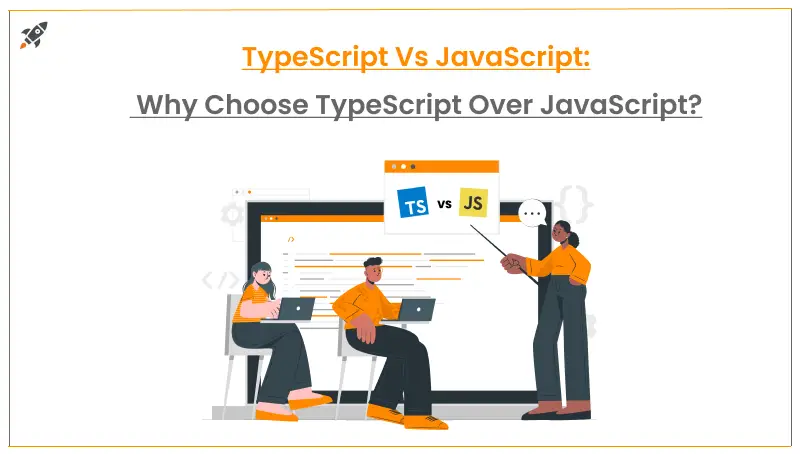This article is a deep dive into one of the most popular computing languages- TypeScript Vs JavaScript.
This article touches on what TypeScript & JavaScript is, the features of TypeScript & JavaScript, the history of TypeScript & JavaScript, and the major differences between TypeScript & JavaScript.
What is TypeScript?
![]()
TypeScript is a superset of JavaScript that is formed and maintained by Microsoft. It is used for creating huge applications that can elevate static typing to the language.
TypeScript works like C++ header files and how they define the creation of current files. In the same way, it supports files that include the type of JavaScript libraries. This allows other languages to work on well-stated files as mentioned as statically TypeScript entities.
This article will further delve into the reasons why use typescript and the tale of Typescript Vs JavaScript.
What is JavaScript?

JavaScript also called JS, follows the order of the ECMA script. JavaScript is a software design language compiled in just-in-time, high-level, multi-pattern. This contains curly bracket syntax, first-class functionality, dynamic typing, as well as prototype-based object orientation.
Next to languages like CSS and HTML, JavaScript continues to be one of the most important technologies on the World Wide Web.
History of TypeScript
The first-ever TypeScript was introduced in public in 2012. However, TypeScript 0.9. was made in 2013 after internal developments at Microsoft.
Following that year, TypeScript’s five times faster version was released, and later in 2015, it was renovated to support ES6 modules and namespace keywords.
History of JavaScript
JavaScript’s history traces back to 1995. It was created by Brendan Eich, who was a programmer at Netscape Communications Corporation. Initially, JavaScript was considered only for Netscape navigators.
However, after gaining success as a scripting tool, its name was changed from LiveScript to JavaScript.
Why TypeScript?
This section is an overview of all the reasons why use TypeScript.
- Static Typing: In static typing, the compiler guarantees that the values used are of the same type. Typescript lets the user know about the compile error before they run the program. It saves time for the programmer for hunting down the issue.
- Employing New Features of ECMAScript: The new features of ECMAScript range from modules, iterators, generators, lexical block scoping, and class declaration. All features of ECMAScript offer programmers asynchronous programming and tail calls.
- Enhanced IDE support: TypeScript offers a wide range of IDE support which covers large Angular frameworks to small-scale projects. IDEs include Visual Studio 2019/2022, WebStorm, and Visual Studio Code.
- Type Inference: TypeScript offers developers implicit typing. With the help of this feature, developers do not have to specify the types as the compiler finds them on its own.
- Interoperability: TypeScript is interoperable which means the code from TypeScript to JavaScript is easy. The modules for JavaScript can be used for TypeScript also and vice versa.
Why JavaScript?
There are multiple reasons why JavaScript remains popular as one of the chosen programming languages among developers in this TypeScript Vs Js.
- Fun and Interactive Language: Java’s interface is user interactive which makes it easier and fun for the users to play with its UI. Java’s graphical UI offers developers to experiment and create interactive projects during their initial stages itself.
- Low Threshold to Get Started: JavaScript is an easier language to work with in terms of its installment and running the code on the browser. This is observed that with other languages, programmers have to install other supporting programs along with JavaScript for its smooth execution.
- Superior Debugging Tools for Learning: JavaScript consists of a range of debugging tools used for learning. This allows the programmers to experiment with Java UI and receive quick feedback.
- Strong Support for Learning: The community of programmers at JavaScript is known for being supportive and active toward each other. This contributes to a Hubspot of knowledge for beginners and helps them to learn and grow from other programmers’ live code.
- Foundational Language for Learning Programming Styles: JavaScript is an event-oriented programming language which means the code is under the control of the system events. This is helpful for beginners and programmers who are new to the language. It is a great way to teach JavaScript and how scalable server-side systems work.
- Rich interfaces: JavaScript is known for its graphic and interactive interfaces. With the help of JavaScript, programmers can create the most engaging UX. Similarly, programs like vue.js are altering their systems to support more animations and transitions.
Features of Typescript
- Static Typing: TypeScript offers programmers an additional feature of static typing through TypeScript Language Service (TLS). The type of a variable declared with no type may be inferred by the TLS based on its value.
- Compatibility: TypeScript is interoperable as discussed in the earlier section of this article. The foundational structure of TypeScript is adopted from JavaScript and it is easier to convert code from typescript to JavaScript during execution.
- TypeScript is portable: TypeScript can be operated on different browsers, operating systems, and devices. TypeScript can be executed on any system that JavaScript works on.
- TypeScript supports JavaScript libraries: As mentioned in the earlier segments, Typescript is fully compatible with JavaScript and it can be reused for all JavaScript frameworks and libraries.
Features of JavaScript
Following is a list of the important features of JavaScript that makes it one of the most preferred programming languages.
- User Input Validation: One of the significant features of JavaScript is its user input validation. This feature allows users to communicate with the client through the medium of forms.
- Platform Independent: JavaScript is an independent programming language that is supported on all systems including Windows, Macintosh, etc. This makes it possible to include it in any other script like HTML.
- User’s Browsers and OS: JavaScript runs on all major platforms and thus it easily detects the user’s browser and OS.
JavaScript requires users’ browsers prior to processing which is useful for producing code for different browsers - Client-side Calculations: JavaScript is a client-side technology which means it executes calculations on the browser itself and does not inquire about the server for each task.
TypeScript Vs JavaScript: Head-to-Head Comparison
This section explains the differences between JavaScript and TypeScript.
1. Learning Curve
The first factor in this battle is learning ease. TypeScript requires prior knowledge of coding and programming languages. However, JavaScript is easier and one of the most flexible scripting languages to learn.
2. Prototyping
The second factor in JavaScript Vs TypeScript is TypeScript consists of an additional feature of prototyping whereas Java Script does not have it.
3. Annotation
The code for Typescript has to be constantly annotated to use TypeScript to the best of its capabilities. On the contrary, JavaScript does not require any annotations.
4. Data Binding
TypeScript uses a plethora of concepts including types and interfaces to describe the type of data being used and processed. JavaScript does not use such kinds of concepts which makes it a bit easier than other programming languages.
5. Ecosystem
The ecosystem is an integral factor of JavaScript Vs TypeScript. The ecosystem of TypeScript is based on intuition and it allows programmers to statically type different types of idiomatic features.
JavaScript, on the other side, provides programmers a platform to explore and experiment with its interface.
6. Compilation
The compilation is another important threshold in this tussle between JavaScript Vs TypeScript. Typescript code required compilation for its execution on platforms whereas JavaScript does not need any code compilation.
7. Community
TypeScript is a bit harder when it comes to learning because of which it has a very closed community with a limited number of learning resources. The JavaScript community is known for being active and helpful to its young programmers. It is a bigger association that helps its programmers in need.
Advantages of TypeScript over JavaScript
In this tussle of TypeScript vs Js, let us go through the advantages that Typescript has to offer over JavaScript.
- Faster Error Detection: According to scientists, TypeScript is known for weeding out 15% of common bugs at the compile stage itself. This reduced the burden of quality assurance activities.
- Optional Static Typing: As discussed earlier, TypeScript offers a static typing feature that warns the compiler against any type-related mistakes during the production phase itself. JavaScript is dynamically typed and checks errors only during the execution.
- Code Optimization: TypeScript has enhanced development speed owing to its added features of annotation, generics, IntelliSense, and API documentation. JavaScript, on the other hand, lacks additional features.
- Enhanced IDE Support: TypeScript offers increased IDE support that includes features like code, navigation, suggestions, and auto-completion.
It allows programmers to receive errors as soon as they occur. - JavaScript Compatibility: Each device or browser that executes JavaScript is compatible to work with TypeScript.
Typescript offers programmers to transform a part of the code or the complete app at once if needed by creating a configuration file to the root.
Why Should You Migrate Your Project to TypeScript?
For developers with experience in coding, it is easier to work with TypeScript due to its additional features like type inference. With type inference, it automatically adds types without actually integrating them.
Apart from it, every JavaScript file is technically TypeScript as they are interoperable. Thus, in this js vs ts, it depends on the developer and their requirements if they want to migrate to TypeScript.
TypeScript Vs JavaScript: A Quick Summary
In conclusion of js vs ts, we can say that both TypeScript and JavaScript are developers’ friendly languages. However, the debate of the difference between typescript and javascript boils down to programmers’ stage and their needs.
Somebody who is just beginning in this field would find JavaScript easy to work with but for bigger and more complex programs it is advised to use Typescript.







